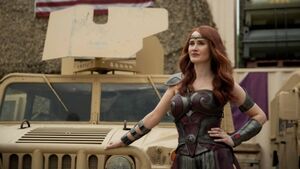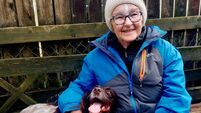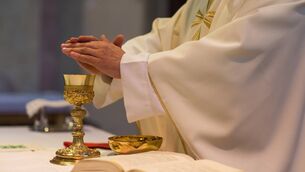Living Greener: We should cherish stories of our heritage

The Irish myth of the warrior queen Maeve inspires the hit Amazon show The Boys
As naturally and compulsively as bees build hives or beavers build dams, you tell stories.
When you unload your troubles at the end of the day, or declare your love, or argue a point, you tell a story.
You are the hero of your own story, and your life has whatever meaning the story gives you.
Author Neil Gaiman once retold a story from Ancient Egypt, of two brothers who were split apart by a treacherous woman.
After one died, the other travelled the Earth to find a way to bring him back, until finally – after many adventures – the two were reconciled.
That we could be moved by a voice from thousands of years ago is remarkable enough – but it gets better.
Years after reading the story, Gaiman chatted with an archaeologist recently returned from excavating ruins in Egypt.
Around the campfire at night, she said, the local Egyptians took turns telling stories, and one offered a tale he heard from his father. It was the same story of two brothers, passed down through four thousand years.
A good story outlives any other man-made thing, Gaiman said, so if we want to pass on something important, we’d be wise to wrap it in a story that everyone will want to retell.
People who lived in the shadow of a dormant volcano could have simply warned their children that it occasionally erupts – but the more generations pass without another eruption, the more likely no one will believe the story enough to retell it.
If, however, they tell the heartbreaking tale of a maiden who fell into a forbidden love affair and was sacrificed to the fire in the mountain, everyone will want to pass it on.
And in the tale is the knowledge that the land itself is not as solid as it appears; every so often, the ground itself can shudder, that mountains can breathe fire and black snow – and what to do when it happens.
Nor are Egyptians even close to holding the record for the oldest stories; Australian Aborigines tell stories of the rising seas that seem to date from the last Ice Age. A people’s stories make them who they are, and until recently the Irish had the same traditions.
When Seosamh O’Dalaigh sat down with Peig Sayers of the Blasket Islands, she told him 375 stories, 40 of them epics. In rural Ireland, my neighbour Mary remembered, almost all communities had their own Peigs.
“There was an institution called cortorach, Irish for visiting, and the people would visit each other’s houses,” my neighbour Mary said.
“It was huge in the country ... they would have a sennachai – a storyteller – and he’d be spinning great yarns and tales, some of them the old, old stories. Some of them might be two thousand years old, really stories from prehistory – stories of Cu Chucullen and Meave, stories from long long ago. Senna is the Irish word for old, so a sennachai was telling the old stories. (It happened) at least once a week at least, and nearly every night at times,” Mary said.
“You can imagine it, the kitchen and ... a turf fire, and very warm, and the people gathered around listening to the sennachai telling his story ... And the children were supposed to go to bed but were allowed to stay up, and would listen to the sennachai, their eyes wide like saucers.” Just as Homer could recite the Iliad and Odyssey – each perhaps 700 pages written down – from memory, so did storytellers in most traditional cultures. My neighbour Jack said his local sennachai “could spin those stories so well that no one would go home until it was daylight”.
One elder remembered his uncle Ned telling them stories of “black Bran,” Bran Dubh MacEchach, an ancient warrior from west Wicklow whose exploits are recorded in the annals of Ulster.
‘The literature, which has been preserved entirely by oral tradition, includes ancient legends, some of them older than Beowulf ... and a wealth of folklore, still only partly collected,’ wrote Moya Llwellyn Davies of the Blasket Islanders.
Today most of us were raised not with the stories of our families and places, but with stories sent to us from Britain or the USA, movies and pop hits and internet memes, the same ones as in any other country.
More and more, we think only the thoughts dictated to us from far above and far away.





